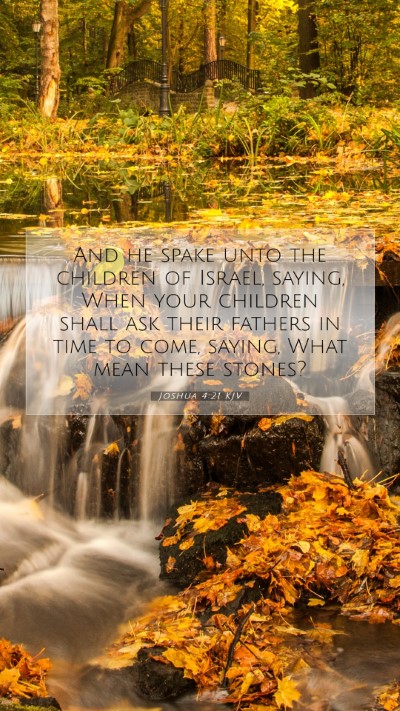Old Testament
Genesis Exodus Leviticus Numbers Deuteronomy Joshua Judges Ruth 1 Samuel 2 Samuel 1 Kings 2 Kings 1 Chronicles 2 Chronicles Ezra Nehemiah Esther Job Psalms Proverbs Ecclesiastes Song of Solomon Isaiah Jeremiah Lamentations Ezekiel Daniel Hosea Joel Amos Obadiah Jonah Micah Nahum Habakkuk Zephaniah Haggai Zechariah MalachiJoshua 4:21 Meaning
What is the meaning of Joshua 4:21?
And he spake unto the children of Israel, saying, When your children shall ask their fathers in time to come, saying, What mean these stones?
Joshua 4:21 Bible Verse Meaning
Understanding Joshua 4:21
In this study, we delve into the meaning and significance of Joshua 4:21, exploring its interpretations through insights from public domain commentaries by Matthew Henry, Albert Barnes, and Adam Clarke. This verse serves as a vital link in understanding the journey of the Israelites and their covenant with God.
Verse Text
Joshua 4:21 (KJV): "And he spake unto the children of Israel, saying, When your children shall ask their fathers in time to come, saying, What mean these stones?"
Verse Meaning and Commentary
This verse captures a significant moment in biblical history, focusing on the act of remembrance and teaching future generations about God's mighty deeds. Let's explore its meaning:
-
Importance of Memory:
Matthew Henry emphasizes the significance of memory in faith. The stones represent God's miracles during the crossing of the Jordan River. They serve as a memorial to future generations, reminding them of God's power and His commitment to His people.
-
Parental Responsibility:
Albert Barnes highlights the role of parents in teaching their children about the faith. The verse suggests that when children inquire about the meaning of these stones, it is a prompt for parents to share the stories of God's providence and deliverance, thus reinforcing the values of their faith.
-
Teaching Moment:
Adam Clarke notes that this inquiry by future children emphasizes the necessity of imparting knowledge about God’s actions to the next generation. Parents should be prepared to explain not only historical events but also their spiritual implications, fostering a deeper understanding of Scripture.
-
Historical Context:
Understanding the historical context of this verse is key. The Israelites had just crossed the Jordan River, marking the entrance into the Promised Land. This act of remembrance through the stones highlights their journey and God’s faithfulness, making it an integral teaching point for Israel's national identity.
Application of the Verse
The essence of Joshua 4:21 touches on crucial themes that can be practically applied in today’s world:
-
Encouraging Family Discussions:
This verse encourages families to discuss their faith and the works of God in their lives regularly, utilizing both history and personal testimonies to reinforce beliefs.
-
Creating Memorials:
Just as the stones served as a memorial, individuals today can create symbols or traditions in their families to remember and celebrate God’s accomplishments in their lives.
-
Intergenerational Teaching:
The verse encourages a flow of knowledge from parents to children, reminding the church community of the importance of mentorship and teaching biblical truths to younger generations.
Cross References
Joshua 4:21 also connects with several other scripture passages:
- Exodus 12:26-27 - The significance of teaching children about God's deliverance during Passover.
- Deuteronomy 6:6-7 - A call for parents to teach their children diligently about God's commandments.
- Psalm 78:4 - A poem addressing the importance of recounting God's works and laws to the next generation.
Conclusion
Joshua 4:21 encapsulates the underlying principle of Bible verse meanings, emphasizing the responsibility of families to cultivate a rich understanding of faith and history in their children. This verse provides an excellent framework for Bible study groups and can be incorporated into Bible study tools and resources.
In online Bible study contexts, this verse serves as a conversation starter about the importance of remembrance and the ways we can instill faith into upcoming generations. Thus, the message of Joshua 4:21 remains relevant, challenging all believers to grasp the significance of their faith and share it meaningfully.


